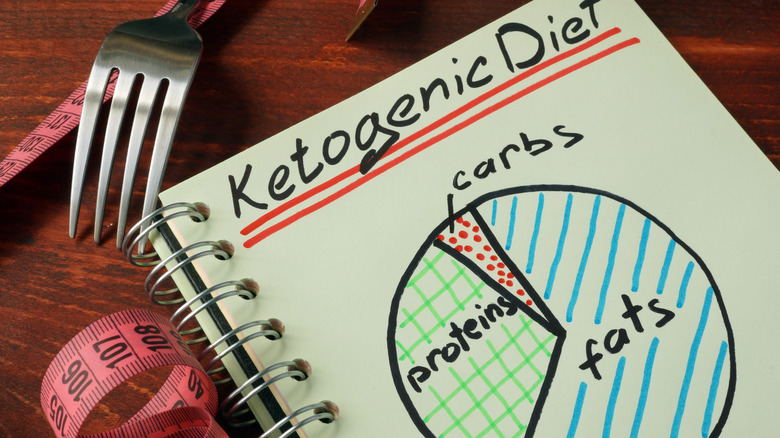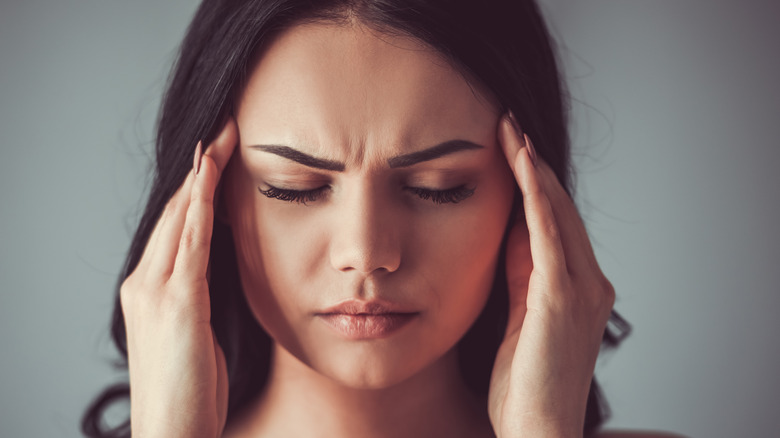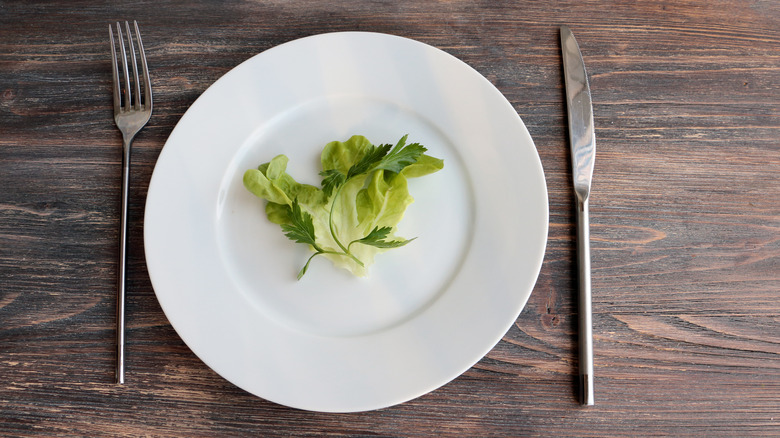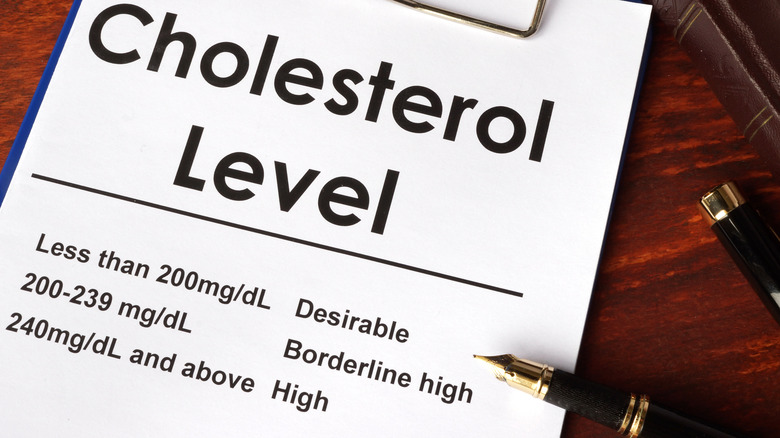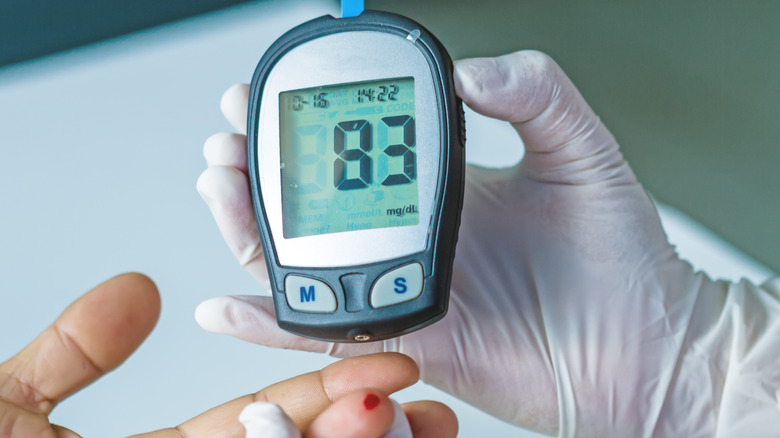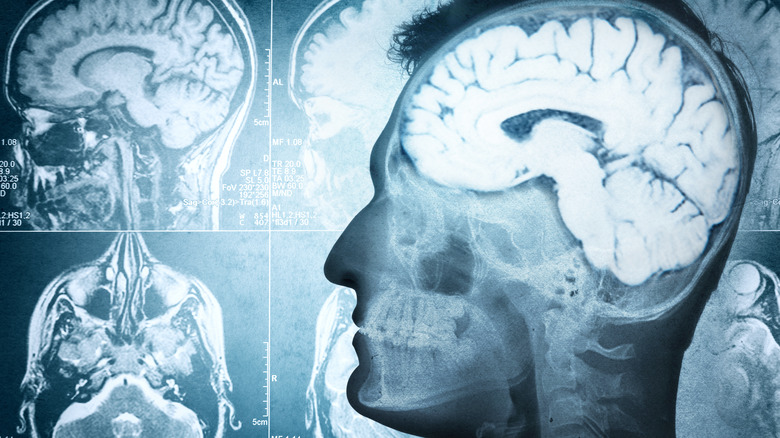What Really Happens To Your Body When You Eat Keto
The ketogenic or "keto" diet is one of the latest low-carb diets taking over your Instagram feed. You may have heard of people going "keto" and seen the photos of all the bacon, cloud bread, and cheese they are eating. This diet may seem "new" because it's suddenly super popular on social media and with celebrities, who are claiming it as their weight loss secret weapon. Actually, it is not "new" at all. It was initially developed in the 1920s as treatment for epilepsy in children, but fell out of favor as other treatments for the condition were developed.
In the mid-1990s, Dateline aired the story of a 2-year old boy with seizures who had had great success with the ketogenic diet improving is symptoms. This renewed interest in the diet, especially after a TV movie was made about it starring Meryl Streep.
Although it's still used today to treat conditions such as epilepsy and autism, it has also become popular due to celebrities like Kim Kardashian using it to drop 60 pounds post-baby. So, is keto the weight loss secret you've been praying for? Is it really possible to eat all the cheese, bacon, and butter you want, and lose weight? As a dietitian, my answer is maybe, but there are a few things that may happen to your body along the way.
What is the ketogenic diet and ketosis?
The ketogenic diet is a low carbohydrate, high fat, moderate protein diet that recommends limiting carbohydrates to anywhere between 20 to 60 grams per day. Generally, the ketogenic diet is about 75 percent fat, 20 to 25 percent protein, and 5 to 10 percent carbohydrates. Calories are usually not limited on the keto diet. This may seem like heaven to some people because it allows them to eat as much as they want, as long as they stick to the general principles.
The purpose of keeping carbs low is to achieve a metabolic state called ketosis, where your body is essentially forced to stop using glucose or carbohydrates for fuel, burning fat instead. When your body is deprived of carbohydrates — its primary energy source — it begins to utilize a substance derived from fat, called ketones. Your body then begins to tap into its fat stores for energy.
The exact number of carbohydrates to achieve ketosis depends on the individual. Protein intake can also have an affect. Additionally, when you primarily eat fat, your blood sugar doesn't increase after a meal, therefore your insulin levels stay stable. Insulin is a hormone that encourages storage of calories after a meal, therefore controlling insulin levels may also prevent calories from being stored, resulting in weight loss.
You may experience the keto flu
When you first eliminate carbohydrates from your routine as part of the keto diet, you may experience some unpleasant symptoms the first week or so as your body begins to switch over to burning fat instead of carbohydrates. These symptoms are referred to as the "keto flu" and can include sugar cravings, dizziness, muscle cramps, nausea, brain fog, fatigue, headaches, and trouble falling asleep. These symptoms usually resolve within a week or so, once your body has adjusted.
Another odd side effect of being in ketosis is that your breath may smell sweet like acetone or nail polish remover. One of the ketones created during ketosis is acetone, which is expelled via the breath. Chewing sugar free gum can help mask this symptom.
During this period, be sure to drink plenty of water, up your fat intake, and consider drinking a sugar-free electrolyte beverage to help. The keto flu should only last a few days as your body transitions.
Your appetite may decrease
Ketosis may help you control your appetite and therefore eat less. I spoke to dietitian Lara Clevenger, MSH, RD, LD/N, CPT, who is a proponent of the ketogenic diet because of the changes she has seen in her own appetite from adopting this eating style. She says, "From my own experience, it helps reduce sugar cravings, appetite, improve sleep quality, increase energy levels and resulted in weight loss...most likely weight loss was caused by decreased oral intake."
The reason people experience a decrease in appetite on the keto diet is that your body learns to rely on fat, instead of carbohydrates for energy. Most of us only can store about 2,000 calories worth of carbohydrates in the liver and muscles, until our bodies require us to eat more carbs to maintain our energy. But, we store well over 20,000 calories worth of fat, even if we are not overweight. Once your body learns to utilize fat instead of carbs, appetite decreases as it taps into those fat stores when it needs fuel.
Your energy may increase
Many people on the keto diet report feeling more energy after the initial "transition phase." In a recent conversation with Jennifer Dickert, RD, LD, she told me that the "ketogenic diet can be helpful for disorders of mitochondrial dysfunction such as chronic fatigue syndrome."
In a 2009 study comparing low carb dieters with dieters following a higher carb diet, the former were able to respond to cognitive tasks faster, which may be a sign of increased mental focus and energy. It makes sense that following a low carb diet would result in increased energy levels because fluctuations in energy are highly connected to low or high blood sugar levels. If your blood sugar remains relatively stable, so should your energy.
You may lose weight
The keto diet has been promoted as resulting in dramatic weight loss. And there is definitely research to support that. A 2013 meta-analysis in the British Journal of Nutrition evaluated available research on very low carb diets (less than 50 grams of carbs), versus a low-fat diet. Researchers found that across all studies reviewed, those subjects following a low carb diet had a greater weight loss than those who followed the low fat diet.
The weight loss experienced with the ketogenic diet may be related to two factors: a decrease in calories and an increase in energy. Eating fewer calories leads to weight loss. Ketosis makes it relatively easy for most people to eat fewer calories because they are just not hungry. Second, the increase in energy may give you more energy to exercise, which also helps you lose weight.
You may gain weight
Before you jump on the keto bandwagon as a solution to all your weight problems, let me give you a word of warning: the keto diet doesn't show amazing results for everyone who tries it. Social media can give us the false impression that everyone quickly loses enormous amounts of weight on keto, but that's not quite accurate.
One of the big mistakes I see people making with keto is trying to "keto-fy" everything and thinking that just because it doesn't have carbs, that you can eat as much as you want. The reason keto works for weight loss is because it helps reduce appetite, and therefore calories. Eating too many calories, even if keto-approved, will not result in weight loss and may even cause weight gain.
Remember, keto encourages the intake of fat, which has over double the calories of carbs or protein. Regardless of what some may lead you to believe, eating too many calories is eating too many calories. And you won't experience the weight loss you're seeking.
Your cholesterol levels may improve
This may be a surprise, as we have been led to believe that eating lot of fat increases cholesterol levels and can lead to heart disease. But, the "lipid hypothesis" as it's called, hasn't really turned out to be completely true.
A 2014 review of over 32 studies on fat intake and heart disease found no connection between the two, meaning a high fat diet didn't cause heart disease. A 2004 study published in the Journal of Experimental and Clinical Cardiology found that cholesterol levels actually went down in obese subjects during the 24-week study period.
The weight loss experienced with the keto diet may explain some of these results, as losing weight can help improve cholesterol levels. If you have high cholesterol, but want to try the keto diet, I recommend speaking to your doctor so he or she can monitor your cholesterol levels.
Blood sugar may improve
Since the keto diet dramatically cuts the intake of carbs, blood sugar becomes stable. A 2005 study published in the Annals of Internal Medicine found that following a low carbohydrate diet for just 14 days not only normalized glucose levels in diabetic subjects, it reduced their average blood sugar by around 30 mg/dL.
The keto diet is a great way to help control blood sugar levels. If you already have diabetes, particularly type 1, I would recommend you speak to a doctor before trying the keto diet as modifications may need to be made to your medications and insulin regimen.
Brain health may improve
Danielle Abermon, RDN CHWC, is a dietitian who specializes in using the keto diet for people with neurological diseases such as migraines. She recently told me it's a "targeted therapeutic diet for migraines and the brain fog that is commonly experienced with frequent and chronic migraines." She states that after being keto for a few months, many of her patients are able to reduce medications used to treat these conditions.
But it's not just for migraines. It can help improve memory and cognition for people at risk for Alzheimer's disease. A 2012 study found that after just six weeks on a low carb diet, memory scores of people with mild cognitive deficits improved, compared to those on a high carb diet. It's believed that the improvement of insulin and blood sugar levels, as well as a decrease in inflammation from eating a low carb diet, may be what improves memory.
Who shouldn't eat keto
Women who are pregnant or breastfeeding should avoid the keto diet as it eliminates too many nutritious foods needed to support the mother and infant during an important time of growth. In general, healthy children should not eat a keto diet for the same reasons, as it doesn't provide the nutrients their bodies need.
Type 1 diabetics should be cautious and be closely monitored by a physician or dietitian if they are eating a keto diet. And lastly, people with disordered eating should not eat keto as the limitations can make eating disorders worse. Amy Kubal, MS, RD, LN, summed it up perfectly, when she told me that a ketogenic diet "is not a magic weight loss bullet or miracle cure. It should not be done without guidance or without evaluating if it's an approach that is physically and mentally sound for you."
Doing what's healthy for you
If you need to lose weight, the keto diet may be a good option to help decrease appetite, and in turn promote weight loss in the short-term. But, be wary, there are a lot of people sharing unrealistic results on social media, claiming their success with keto.
The best way to go about it is to work with a dietitian who specializes in ketogenic diets, so you can be sure you're doing it correctly and in a realistic way for you.
It's unlikely most people will be able to follow a strict keto diet long-term. Once you reach your goal, you will likely need to begin eating a slightly higher number of carbohydrates again, until you figure out the amount that it is right for you. If you're healthy, and your doctor agrees, the keto diet could be an effective strategy for weight loss, balancing blood sugar, and boosting brain function!
